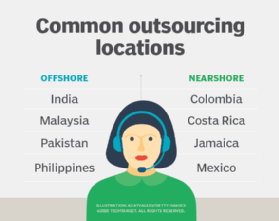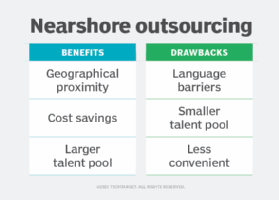nearshore outsourcing
What is nearshore outsourcing?
Nearshore outsourcing is the practice of getting work done or services performed by people in neighboring countries rather than an organization's own country.

The most common types of jobs that are outsourced include software development, technical support and call center jobs.
Nearshore outsourcing is contrasted against offshoring and onshore outsourcing.
Nearshore vs. onshore vs. offshore outsourcing
While nearshore outsourcing involves hiring for services in nearby countries, offshoring involves employing or contracting services in countries that are further away. These options provide a stark contrast from onshore outsourcing, which is simply employing or contracting services from someone outside the organization, but still within the same country.

For example, for companies in the U.S., outsourcing nearshore might be to countries like Canada and Mexico. However, full offshore outsourcing could be to Asian countries like India or the Philippines; South American countries like Argentina or Brazil; or European countries like Ukraine.
Choosing outsourcing destinations depends heavily on a business's requirements and the type of job.
The pros and cons of nearshore outsourcing
Nearshore outsourcing has its pluses and minuses:
Pros
- Closer geographical proximity. This means that travel and communications are easier as the outsourcer is likely to be a similar time zone. For companies that utilize offshore outsourcing, the time zone differences can be hard to manage when meetings are needed or a quick turnaround is required.
- Cost savings. Nearshoring can be more cost effective depending on the location and the type of job, although this is not always the case. For example, nearshore software development is a far more specialized skill and, therefore, labor costs may not be as inexpensive as, say, a call center.
- Larger talent pool. In addition to in-house talent and outsourcing within the states, by nearshoring, a business can significantly expand access to various high-quality service providers and outsourcing partners.
Cons
- Language barriers. While not true in all instances, there are some cases where language barriers and cultural differences can make maintaining an nimble working relationship difficult. However, this is not always the case as there are many neighboring countries that exhibit cultural similarities.
- Not as large of a talent pool as offshore outsourcing. While nearshore outsourcing provides a larger talent pool than onshore outsourcing, it's not as large of a talent pool as offshore outsourcing.
- Less convenience. In some cases, it's not as convenient for teams in different locations to work together. For example, in software development outsourcing -- during a deployment where rapid response and troubleshooting is required -- it may not be feasible for two people in different locations to work together and be able to provide a quality software product. However, organizations can often resolve these types of IT service issues with pre-determined, rotating on-call schedules.
For organizations interested in outsourcing, a nearshore outsourcing company can help provide quality service at a lower cost while also helping to facilitate adoption of the organizations' business processes and protocols that their in-house team use.







